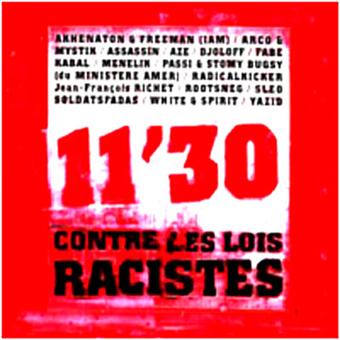With the political news, we have chosen to reopen the debate on the relationship between the world of rap and the extreme right. Despite a certain “depoliticization” of this musical trend, does a rapper have to be against the extreme right? Should artists take a stand and express themselves with regard to the rise of the National Rally (National Front)? Can someone who claims to love rap music share the values of candidates like Marine Le Pen or Éric Zemmour? For us the respective answers to these questions are obviously yes, yes and no. Explanations.
Historically, rap and more generally hip hop is a socially and politically committed movement. Born in underprivileged areas and initially practiced by people from the suburbs, French rap and its actors carried a discourse against very right-wing ideas.
Between 1997 and 2002, the National Front obtained significant results during elections. As the loudspeaker of a multicultural French youth and bearer of hip hop values, French rap took on the role of being in frontal opposition to the extreme right and the ideas that contaminate politics. One of the leading figures is the song 11’30 against racist laws, released in 1997, which marked the time. At the end of the 90’s, the Marseilles rappers were particularly virulent against the National Front, which had won several mayorships in the South. We can cite significant events such as the murder of young Ibrahim by FN poster-posters, which united this scene against this racist and xenophobic party. In 1998, the rapper Faf La Rage explained that his way of rapping was a way of taking a stand against the FN.

Who can claim to make rap music without taking a stand?
At that time, artists were not content to simply take a stand on records. Speaking out in the media was common and the commitment strong. Today, with social networks, they have even more channels to broadcast their positions. However, they are very rare among mainstream rappers who have a large fan base. Could this neutrality hide a fear to speak out? Or just a pure and simple disinterest on the political subject? It is true that with the commercial importance that rap has taken, the defense of hip hop values is much less present. But we sometimes witnessed some surprises. Koba LaD does not seem at first sight the most committed. However, in recent days, he called on these social networks, to vote Emmanuel Macron to block Marine Le Pen. An unprecedented gesture, to be welcomed.

On the other hand, Booba, who used to voluntarily show his hatred against racist politicians, has publicly admitted to agreeing with some of Eric Zemmour’s ideas. A faux pas that further tarnishes the end of the controversial career of the one that many consider to be the greatest rapper in the history of our country.
NO TO THE INDOCTRINATION OF CHILDREN. BRAVO MR ZEMMOUR FOR THIS INTERVENTION. I AM OBLIGED TO SALUTE THIS SPEECH. THIS SUBJECT IS FAR TOO IMPORTANT. 🏴☠️ pic.twitter.com/IiyYXNp1i0
— Booba (@booba) April 2, 2022
One can still find traces of stances consistent with the original state of mind of rap. But one must often turn to historical practitioners of this art. Sako, for example, openly supported Jean-Luc Mélenchon during the presidential campaign. He also released a track with Brav in which he fights against right-wing ideas.
Kery James, as usual, has released a committed and anti-fascist song. Entitled “Marianne”, he directly targets the ideas of the leader of the Reconquest party.
Let’s also mention Médine, who, as an informed user of social networks, is not shy about giving his opinion and taking a stand. Between a title rightly named “Médine France”, committed video freestyles or an interview for Mediapart, the man from Le Havre does not hide.
But there are worse things than the lack of commitment of some. We recently witnessed the arrival of identity rappers. We won’t give you any names because it is inconceivable to offer the slightest visibility to these artists. Their existence is an aberration. This should outrage every rap lover and testifies to the recovery of our culture. Will we accept the release of a compilation of rap named Let’s say yes or 10’52 for racism and intolerance? Of course not! It is clear that for us, rappers should be the first messengers of the rap culture and its values. And therefore, they should continue to fight against the extreme right. But also take advantage of their fame to mobilize the youth against extreme and racist ideologies.
Rap: consumer product or real culture?
In reality, the question of the position of the rap world in relation to the extreme right did not arise for two decades. It is only since the return of this music to the top of the charts that the debate has been raised. At least among some people. Indeed, in recent years, mainstream rap has become a club music. A music where the entertainment took the place of the conscience. Form but very little substance.
This mutation has favored the fact that rap music has become “fashionable music”. By definition, if a music is fashionable, it becomes listened by more and more people. And therefore more and more young people who are the main consumers. Many of these young listeners have discovered rap in its new form without having discovered the culture that goes with it.
Moreover, this new public, which has access to music much more easily than before, comes from different social classes. And who says different social classes says different political opinions. We could say that this new rap has given birth to a new public. And the preoccupations of the latter are rather far from those of the youth who lived the first 15 years of French rap. For the new audience, rap is just another music. Whereas for those who knew its first hours, it is a culture in its own right. A culture whose first activists were part of the minorities now stigmatized by the extreme right. It is therefore normal that those who have made or who love this culture cry appropriation when this movement is caught up by people who do not defend any of the original values of hip hop.
You do everything to make this culture look ridiculous. The perfect example of people we hate, try to introduce them to another stv genre but drop the rap and racist interviews. https://t.co/Z8y3kZmm7Q
— MF.Loris (@Naydos_) April 16, 2022
The equation is simple. If a person listens to rap music but shares very right-wing ideas, then he or she is just listening to rap music as he or she would listen to any other music. If they are interested in Hip Hop culture, its history and share its values, then the ideas of Le Pen or Zemmour will not appeal to them. It’s as simple as that.
Of course, everyone has the right to have their own ideas and political orientations. It is even one of the foundations of our society. Everyone is also free to listen to what they want. On the other hand, as far as rap is concerned, we cannot accept that some people introduce extreme right-wing ideas that this music has historically fought against. If only out of respect for the activists who made it what it is today.
And if to be sure that those who claim to be “fans” of rap music share its values and are by definition opposed to the extreme right, we must continue to educate young listeners, then we will do so. Because we have to say No to racism and xenophobia! Because the fight continues! And especially because it is more than a music, it is a culture!
